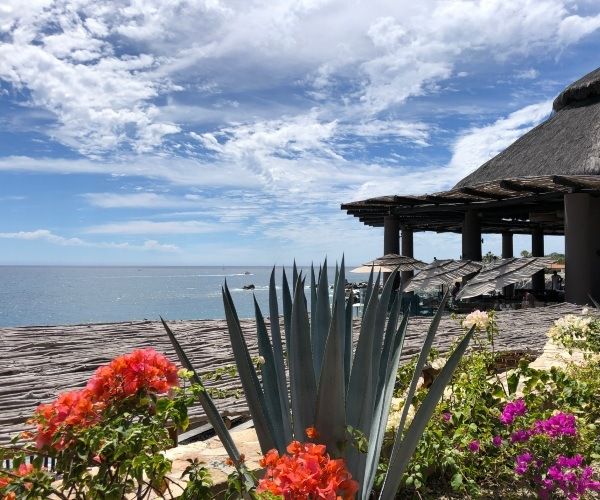
It’s March 11th. Our President has just announced that all US nationals must return from Europe. There is panic at airports, and at universities, where students are studying abroad. There is panic overseas as Americans scramble to get home within the stated two-day window. There is panic everywhere, it seems. I panic, too.
Later that night, my husband, Daniel, and I go back and forth about whether we go away as planned or stay home. It’s spring break, that coveted two-week bridge between winter and spring, cold and hot. We agree—we will stay. An hour later, we agree again—let’s go. The next morning, we agree one more time—we should stay. Rarely are our views in such alignment! Somehow though, it isn’t very comforting.
We are aware that this might be our last family holiday for a while, our last flights for even longer, and that we are taking a chance, slipping through a loophole. We know our family would benefit from time away, together, and outside of the escalating chaos. We realize that if we go, things will most certainly look much different when we return.
We organize ourselves. Prepare to turn around upon touchdown, or, to stay indefinitely. We pack accordingly. Eight bottles of Theraflu, six canisters of disinfectant wipes, four large containers of Purell, and four minis for the plane. Is that enough? Are we really going? What did we agree upon again?
It’s March 14th. We lift off.
Touching down
When we landed in Cabo San Lucas, we were immediately aware that this holiday was going to be unlike any other. One telling sign was that our plane, which would normally be booked solid at this time of year, boarded only 30 passengers. Social distancing, a term that was swiftly creeping into our daily vernacular, was not an issue.
The days ahead would be inherently more reflective, and heavier with the uncertainty of the future. This trip was going to be, I thought, inked in my memory—and not for the usual reasons.
The oasis of Esperanza
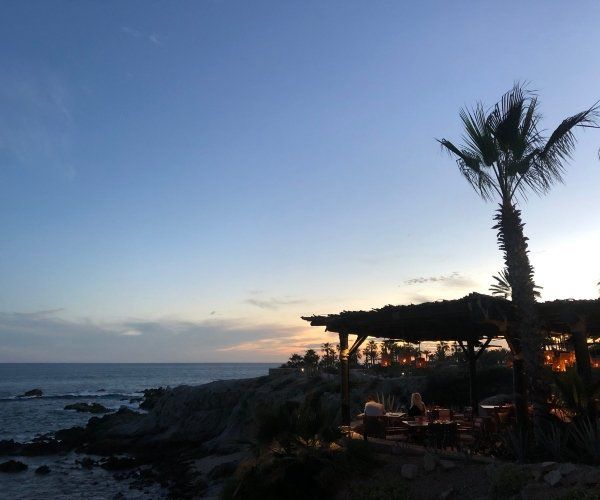
Often, I write about the feeling of a destination, the overall gestalt—to use a theory that would make my art history professor beam with pride. Gestalt is when the brain simplifies and organizes ideas in a way that is more user-friendly and easier to process. For instance, describing the way the linens felt, or guessing which combination of spices was in that unforgettable soup I devoured. How the resort organically settles into its surroundings, or not. Details that prove to be important in the world of inspirational travel. Details that also make for pretty sound bites.
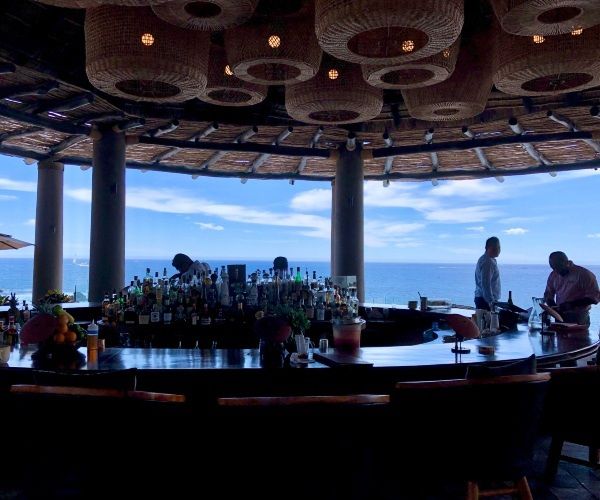
The Esperanza resort, as anyone can see from photos, is a stunning property that sits upon a jagged cliff above the Sea of Cortez. There is much I can say about the beauty, both natural, and man-made, of this Auberge-owned hotel.
In this post, I am going to focus more on the feelings that made our time in Mexico worthwhile, to illustrate the emotional piece of the trip. I’m also going to write about the whales.
The comfort of daily rituals
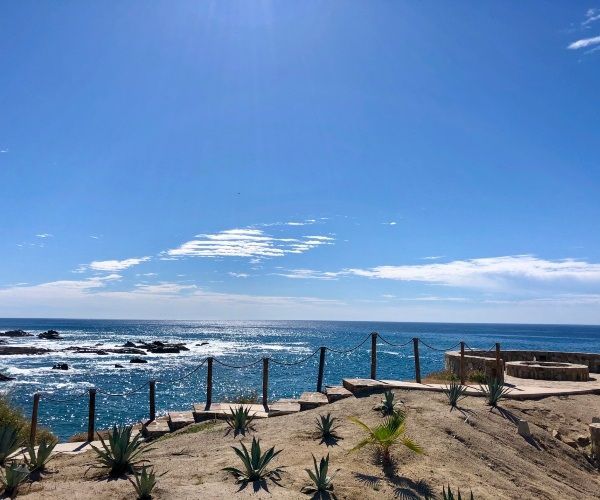
The main restaurant at Esperanza, Cocina del Mar, is an aerie—as easily suited to hawks as humans, perched high above a small beach. Each morning, the kids raced to a large, circular landing at the restaurant’s entrance to catch a glimpse of the daily sand drawing. We all attempted to guess what it might be—an owl, an octopus, an iguana? This part of the day became one of my highlights. It fascinated me how the simplest things could evoke so much pleasure. Perhaps the idea of a surprise, no matter how small, was needed at this point in time.
I fell into a comfortable daily ritual. Each morning at breakfast, I ordered a wellness shot made of turmeric root, lime juice, pineapple, and ginger. I wasn’t really keen on its robust taste or its jarring school bus color but wistfully imagined its medicinal value could keep a virus at bay.
Next, I looked at AppleNews on my phone, giving myself a 10 minute maximum of reading time, as it made my blood pressure rise. Wasn’t I here, in part, to escape the news cycle—which was inconsistent, filled with misinformation, and designed to terrify?
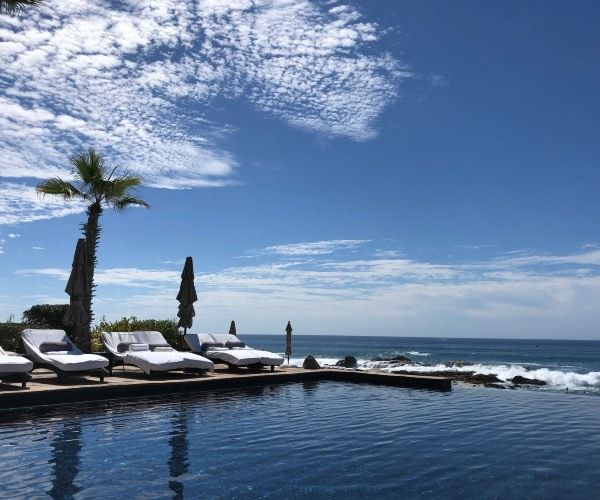
Lastly, I looked at the sea, training my vision for the tell-tale puffs of air that signaled a whale’s presence. Some mornings they popped through the surface like champagne corks on New Year’s Eve, and other days, they were much more elusive. My morning routine settled me, the whale spotting became another highlight and gave me restorative moments of calm. By our second morning, the waiters knew my order, where I liked to be seated and had a pair of binoculars on stand-by.
During our stay at Esperanza, the world outlook became increasingly bleak and the news became direr. I woke up each day, wondering if this was going to be our last here—that this would be the day that we would pack up and go. I relied upon the whales to ground my spinning thoughts. Days passed quietly.
Colors of Cabo
The color palette of Esperanza mimicked the landscape. Pale blue, deep inky blue, warm beige, and foamy shades of white—colors that were naturally soothing. Rolling waves edged up, and then crashed below, the rocky promontory where I sat, showing off as if they were a slo-mo video capture for the latest iPhone advertisement. Who knew how deafening the sound of the sea could be until you had all the time in the world to listen?
The light was so pretty it appeared to stick to the textured rock formations along the beach. Several hundred wet, black crabs moved as one over them, giving the impression that the rocks were fluid, rather than solid. The gestalt theory again, and the principle of ‘common fate’—that our brains will group together individual things that move in a similar direction, and consider it one stimulus.
I watched the cast of crabs (that is the technical term, trust me, I just googled it) scuttle as a unit, and immediately felt my blood pressure drop. Why don’t I watch the Discovery Channel more often, I thought? Wildlife viewing—an organic cure-all.
A pair of iguanas played peek-a-boo around the oversized boulders near the pool. I gathered they were the resident reptiles, and many days I caught them looking for the whales alongside me.
A staff full of kindness
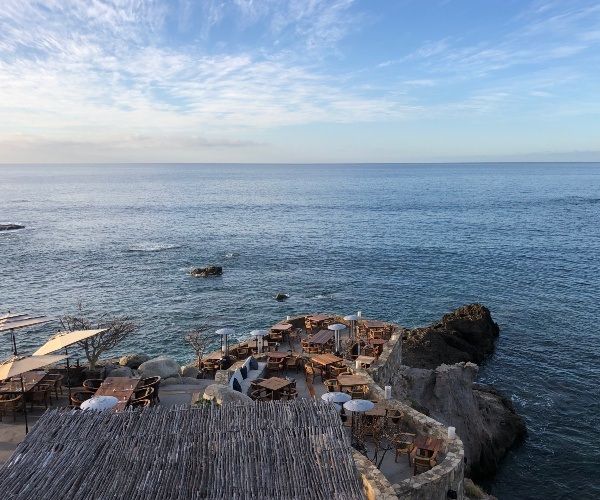
It was clear early on, that the resort was overstaffed, having prepared for the normal onslaught of families from around the world to fill their swimming pools, belly up to their bars, and keep the tennis pros on their toes. The resort, a mix of suites, villas, haciendas, and casitas, looked to be at about 40% capacity when we arrived. At the time we departed, there may only have been about 40 guests left.
Waiters glided about the palm-thatched, open-air restaurants, never forgetting an extra wedge of lime for a beer, or the preference of almond milk over a cow. At Esperanza, attentive service was par for the course, served daily with warm, engaging smiles.
I was ever-impressed by the above and beyond kindnesses, the silent and unsaid courtesies that were extended to everyone, by everyone, all of the time. It was as if the pool staff, waiters, and groundskeepers, all knew that something was changing and that it may be a while before they returned to any sense of normalcy. They were right.
It’s all in the details
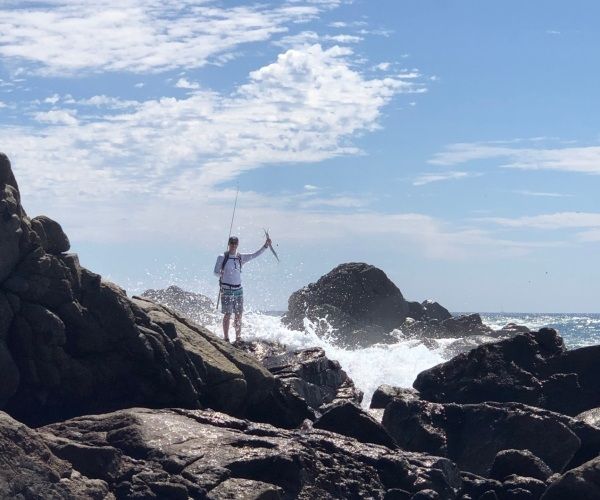
We took advantage of the small bubble we found ourselves in that week. Our family bonded together in a different way than usual—a precursor for the weeks of togetherness ahead.
My son and husband went on a few long desert runs, harassing the rabbits along the paths. The kids rode waves with local surf instructors. I spent hours coloring with fine-tipped markers on the quiet balcony of our room—my current obsession. The kids made Tik Toks—their current obsession. All of us tore through books, having brought stacks from home, just in case.
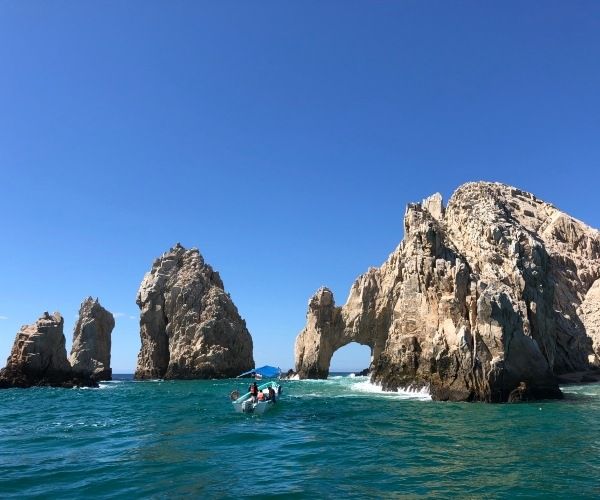
I treasured any moment that got me past recurring doomsday thoughts. The lulling beach hammock, the statuesque iguanas, the pool attendants who wore pins that cheerfully cried; ‘Yes way, rosé!’. The serendipitous moment I photographed a fisherman just as he reeled in his catch, and the way he held up his prize to me. I was a stranger with a camera firmly aimed in his direction, and he posed proudly. The prismatic sunsets each night belied the world’s dark moment.
The intrinsic beauty of Esperanza was seen, and felt, inside and out. The 17 acres of lush, well-kept grounds, complete with an idyllic koi pond, and kid-centric activities like a bocce court and a life-sized chessboard. The nightly bonfire on the terrace of the main entry—these all contributed to the escape from reality we were seeking when we nervously boarded that plane on March 14th.
Finally, the whales
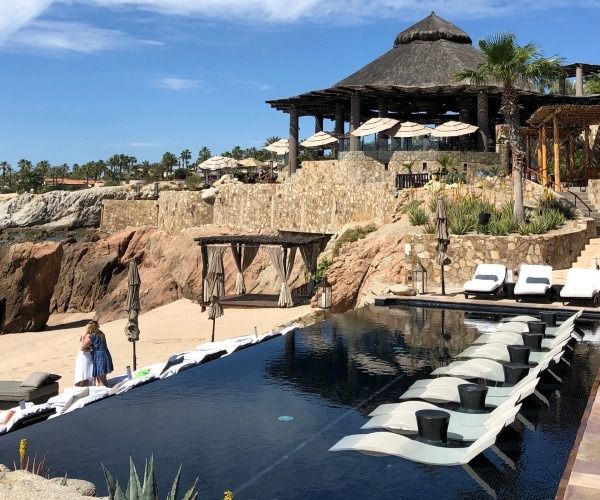
On the day that would become our last full day in Mexico, we spent a few hours at sea searching for whales. The boat picked us up from the pier, and we leisurely motored past the Arch of Cabo San Lucas. This natural rock formation, teetering on the brink of collapse, is located at the southern tip of the Baja Peninsula. Normally, it is overrun with tourist boats competing for pole position. We nearly had it to ourselves.
The captain was well-versed in all things whale, not surprisingly, and had a keen eye for spotting them, even from unfathomable distances. Yet, as prepared as we were to see the whales—witnessing the slow-motion corkscrew movement of one breaching in front of our eyes was nothing short of heart-stopping. The whales’ powerful and muscular bodies were awesome, their tails slapped the water like pancakes being flipped by a short-order cook.
Minutes later, as if the universe was saying; ‘You’ve seen all there is to see here, don’t push your luck.’, a burst of texts from friends alerted us of recent world developments. ‘The US borders were closing.’, they wrote, ‘Come back.’
Our time was up.
Heading home
We had managed six days out of twelve in Mexico, each one a bonus, in my eyes. At breakfast, wellness shot in the hand, I thought that if Esperanza does anyone thing to perfection, it is dining. Even the indoor seating felt like outdoor seating, with transporting views, regardless of the time of day.
Over the course of the week, I noticed the guests who had canceled their trips by their absence on the neatly spaced pool loungers. (Loungers that would have been annoyingly spoken for by 8 am each day.) I noticed the lack of family chatter and light holiday laughter at the empty seats of the restaurants. It was a quiet, self-reflective, spring break. Not exactly what we’d had in mind when we booked so many months ago, but lovely, nonetheless.
My mind filled in the gaps. Another principle of gestalt—closure. In design, it’s the way that the brain will automatically fill in any missing pieces of an image in order to create a whole. What missing pieces will I decide to bring back into my life, and what pieces will I purposely leave out, when we return to what everyone refers to as ‘normal’ life?
Esperanza will once again fill its swimming pools, its bars, and its suites. Likely, it is filling up as we speak, as some restrictions loosen, and people decide they need a break. That they don’t want to cook, go food shopping, or clean dishes. The thoughtful, and extremely capable staff at Esperanza, is waiting. So, are the whales. I’m pretty sure that the whales are waiting, too.
By Jamie Edwards
